De Italiaanse dichter en schrijver Giuseppe Ungaretti werd geboren op 10 februari 1888 in Alexandrië, Egypte. Zie ook alle tags voor Giuseppee Ungaretti op dit blog.
Lied der Beduinen
Eine Frau erhebt sich und singt
Es folgt ihr verzaubernd der Wind
Und legt zu der Erde sie nieder
Der Wahrtraum nimmt sie sich wieder.
Diese Erde: so nackt
Dieser Windstoß: so stark
Diese Liebe: sie loht
Dieser Traum ist der Tod.
Pilgerfahrt
Im Hinterhalt
in dieser engen Gasse
voller Schutt
habe ich
Stunde um Stunde
meinen Karren gezogen
gewöhnt an den Dreck
wie eine Sohle
oder wie ein Same
des Weißdorns
Ungaretti
Schmerzensmann
dir genügt eine Illusion
um dich zu ermutigen
Ein Scheinwerfer
von drüben
erzeugt ein Meer
hier im Nebel
Valloncello dell’Albero Isolato
den 16. August 1916
Vertaald door Eric Boemer
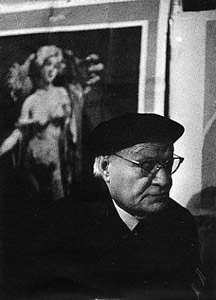
Giuseppe Ungaretti (10 februari 1888 – 2 juni 1970)
De Surinaamse dichteres Carry-Ann Tjong-Ayong werd op 10 februari 1941 in Paramaribo, Suriname geboren Zie ook alle tags voor Carry-Ann Tjong-Ayong op dit blog.
Marowijne
Marowijne
omvat mij weer als vroeger met je vochtige lenden
voer mij mee in je natte omhelzing
naar je monding naar de zee
Marowijne
neem mij mee en verdrink mij in je omhelzing
die ruikt naar zilte lippen
met een vleug van groene absinth
gekruid met de vissige aroma
van je kinderen zwemmend in het vruchtwater
van de watramama
tussen oorverdovende sula
van oeroude rotsen
die mij schuimend naar mijn oorsprong voeren
Marowijne moederschoot
voer mij mee en laat mij slapen
in de eeuwige slaapplaats
in de bron van je vochtige lenden
waar mijn bestaan begon
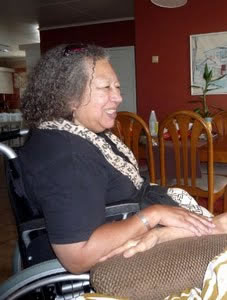
Carry-Ann Tjong-Ayong (Paramaribo, 10 februari 1941)
De Nieuwzeelandse dichteres Fleur Adcock werd geboren op 10 februari 1934 in Papakura, Auckland. Zie ook alle tags voor Fleur Adcock op dit blog.
Leaving the Tate
Coming out with your clutch of postcards
in a Tate gallery bag and another clutch
of images packed into your head you pause
on the steps to look across the river
and there’s a new one: light bright buildings,
a streak of brown water, and such a sky
you wonder who painted it – Constable? No:
too brilliant. Crome? No: too ecstatic –
a madly pure Pre-Raphaelite sky,
perhaps, sheer blue apart from the white plumes
rushing up it (today, that is,
April. Another day would be different
but it wouldn’t matter. All skies work.)
Cut to the lower right for a detail:
seagulls pecking on mud, below
two office blocks and a Georgian terrace.
Now swing to the left, and take in plane-trees
bobbled with seeds, and that brick building,
and a red bus…Cut it off just there,
by the lamp-post. Leave the scaffolding in.
That’s your next one. Curious how
these outdoor pictures didn’t exist
before you’d looked at the indoor pictures,
the ones on the walls. But here they are now,
marching out of their panorama
and queuing up for the viewfinder
your eye’s become. You can isolate them
by holding your optic muscles still.
You can zoom in on figure studies
(that boy with the rucksack), or still lives,
abstracts, townscapes. No one made them.
The light painted them. You’re in charge
of the hanging committee. Put what space
you like around the ones you fix on,
and gloat. Art multiplies itself.
Art’s whatever you choose to frame.
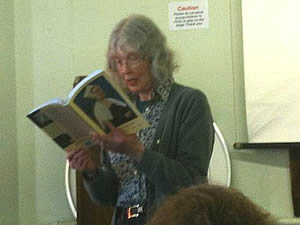
Fleur Adcock (Papakura, 10 februari 1934)
De Franse schrijver, journalist en avonturier Joseph Kessel werd geboren op 10 februari 1898 in Clara, Entre Rios, Argentinië. Zie ook alle tags voor Joseph Kessel op dit blog.
Uit: Les Cavaliers
« Pour l’étalon, son allure tenait moins de la course que du vol. Suspendu, étendu dans l’air, il ne touchait le sol que pour s’en détacher d’un seul battement. Et Ouroz, le visage contre la crinière flottante, le corps léger, délié, comme fluide, n’avait point d’autre voeu que de flotter ainsi qu’il le faisait au-dessus de la steppe et si près d’elle que cette terre, cette herbe et sa propre essence lui semblait confondues. »
(…)
« On choisi dans le troupeau un bouc. On l’égorge. On lui tranche la tête. Pour alourdir sa dépouille, on la bourre de sable, on la gonfle d’eau. On la dépose dans un trou creusé que la toison affleure le sol. Non loin du trou un petit cercle est tracé à la chaux vive. Et il porte le nom de hallal qui, dans la langue turkmène veut dire cercle de Justice. Et sur la droite du hallal on plante dans la steppe un mât. Et sur sa gauche, un autre. A égale distance. Pour la longueur de cette distance , il n’y a pas de règle. Elle peut exiger une heure de galop ou bien trois ou bien cinq. Les juges de chaque bouzkachi en décident à leur gré ». « les cavaliers se rassemblent autour du trou…au signal d’un juge, ils se jettent sur la carcasse décapitée. L’un d’eux s’en saisit, s’échappe…..il s’élance vers le mât sur la droite. Car la dépouille du bouc doit en faire le tour, puis passer derrière le mât placé sur la gauche, et enfin arriverjusqu’au hallal »
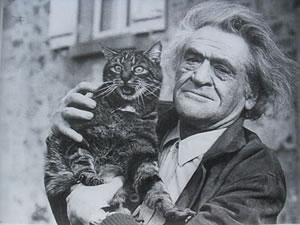
Joseph Kessel (10 februari 1898 – 23 juli 1979)
De Engelse dichter, schrijver en essayist Charles Lamb werd geboren in Londen op 10 februari 1775. Zie ook alle tags voor Charles Lamb op dit blog.
Sonnet To A Friend
Friend of my earliest years and childish days,
My joys, my sorrows, thou with me hast shared,
Companion dear, and we alike have fared
(Poor pilgrims we) through life’s unequal ways;
It were unwisely done, should we refuse
To cheer our path as featly as we may,
Our lonely path to cheer, as travellers use,
With merry song, quaint tale, or roundelay;
And we will sometimes talk past troubles o’er,
Of mercies shown, and all our sickness healed,
And in his judgments God remembering love;
And we will learn to praise God evermore
For those glad tidings of great joy revealed
By that sooth messenger sent from above.
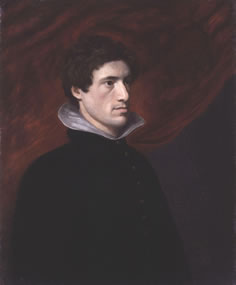
Charles Lamb (10 februari 1775 – 27 december 1834)
Portret door William Hazlitt, voor 1830
De Surinaamse dichter Eugène Rellum werd geboren in Paramaribo op 10 februari 1896. Zie ook alle tags voor Eugène Rellum op dit blog.
Geesten-dans
I
Diep in het bos
brult de lakoe-trom
zijn boodschap uit,
wanneer de ‘Nacht’ gekomen is
bomka – bom – bom!
II
Wat het oog niet ziet
bespeurt de geest;
de medicijn-man
roept zijn ‘herten’ op:
bomka – bom – bom!
III
Sta op, dans mee…
vlijmscherpe houwers,
awara-bomen,
vuur, vuurrr…
bomka – bom – bom!
IV
Maak dat je wegkomt
als je er niet tegen kan.
V
Mannen en vrouwen
brengen hun offers;
ziet ze tekeer gaan…
hoe krijgen ze dat voor elkaar?
bomka – bom – bom!
bomka – bom – bom!
VI
Geesten paren,
spoken slaan de apinti-trom:
bomka – bom – bom!
bomka – bom – bom!
VII
Medicijn-man en
offer-brengers,
wat weten zij,
wat weten wij
van geesten?
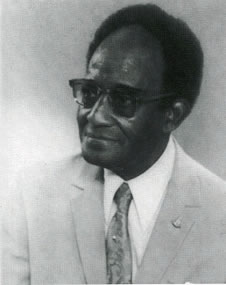
Eugène Rellum (10 februari 1896 – 29 juli 1989)
Zie voor nog meer schrijvers van de 10e februari ook mijn blog van 10 februari 2011 deel 3
